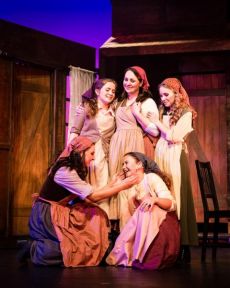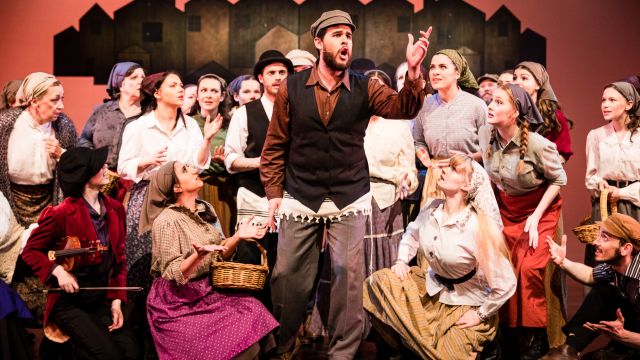Fiddler on the Roof
Willoughby’s Fiddler on the Roof is all life, joy and heart. There’s a zest and warmth in this show that makes it feel fresh and engaging, instead of the respected museum piece it’s usually treated as. After years of watching (enduring?) too many Fiddlers I prepared myself for a plodding ordeal. How wrong I was. The Willoughby Fiddler had me wanting to move to a Russian village and become Jewish.
Director Andrew Benson, MD Matt Herne, and choreographer Steph Edmonds have indeed succeeded in their mission to create a “bold and energetic production”. Nothing was cut from the script and score, yet the show breezed along. Yes, the last part of Act 2 does decelerate, but that’s the script and structure of the show itself. Playing the final scenes too fast would rob the show of its meaning and effect. Even though I knew the show well, watching this version made me see and hear it in a new and better light.
 The orchestra’s excellent playing made us feel like we were in a shtetl circa 1914. The choreography was authentic to the various styles of the time and place, especially in the wedding and kozachok scenes. Moreover, although the dancing was together and had energy, the cast didn’t dance with the robotic precision of concert hall clones, but like villagers.
The orchestra’s excellent playing made us feel like we were in a shtetl circa 1914. The choreography was authentic to the various styles of the time and place, especially in the wedding and kozachok scenes. Moreover, although the dancing was together and had energy, the cast didn’t dance with the robotic precision of concert hall clones, but like villagers.
And how lovely to see a set and props that didn’t fight with the cast to be the stars of the show: it reminds us that true spectacle is found in the performer, not the background.
All the cast owned their roles and were just right for each part. I’ve seen many actors playing Tevye who just copy Topol or Hayes Gordon, so it was refreshing seeing Dennis Clements be his own Tevye, superbly convincing and making you forget about past versions. His “If I Were A Rich Man” is a highlight (mainly because he deviates slightly from the standard performance and the risks pay off), but I was more moved by his rendition of the “Chavelah”Sequence and duet with his wife Golde in “Do You Love Me?”
Speaking of Golde, Belinda Delaney brought a lovely dignity and passion to the role, and her abovementioned duet was a highlight. Her playing of the scene where Golde reacts to hearing of her daughter being wed outside their faith is priceless: anything less would make it come across as soap opera. You really believed Tevye and Golde were wed to each other for 25 years. Tevye’s five daughters, played by Imogen Abba (Tzeitel), Dylan Haley (Hodel), Mikaela Dane (Chava), Katie McPherson (Shprintze) and Chloe McDonell (Bielke), totally charmed us with their portrayal of dutiful-but-questioning daughters, and their “Matchmaker, Matchmaker” wass a delight. Having worked with Dylan Haley forgive my bias, but her rendition of “Far From the Home I Love” was possibly the best and most haunting version of this song I’ve heard.
 The suitors - Luke Holland (Motel), Matt Hourigan (Perchik), Aleksander Justin (Fyedka) - all had the right demeanour and voices for their respective roles. When matched with their respective brides each set seemed a believable couple. Aleksander Justin showed off a major set of pipes as the Cossack soloist in “L’Chaim”. Motel’s and Perchik’s featured songs are known more for their conversational tone than melody, yet these actors breathed life into these tunes and made them more musical.
The suitors - Luke Holland (Motel), Matt Hourigan (Perchik), Aleksander Justin (Fyedka) - all had the right demeanour and voices for their respective roles. When matched with their respective brides each set seemed a believable couple. Aleksander Justin showed off a major set of pipes as the Cossack soloist in “L’Chaim”. Motel’s and Perchik’s featured songs are known more for their conversational tone than melody, yet these actors breathed life into these tunes and made them more musical.
Barbara Hannan’s matchmaker Yente is delicious. She was no Babushka caricature: there’s a shade of darkness here under the benevolent glow. Her furs at show’s end said it all. And speaking of delicious, Stephanie Georgesen’s Grandma Tzeitel and Chloe Angel’s Fruma Sarah in the Dream Sequence are show stoppers, as is the whole sequence itself (good to see Willoughby getting their money back on the Wicked harness). Clive Hobson as jilted butcher Lazar Wolf brought a dimension to the role that made the character sympathetic.
And this is another one of these choruses that are simply brilliant. From Mitch Bryson’s Constable and Phil Lucas’s Mordcha to the one-liners and non-speaking roles, it felt like everyone was a villager and we were watching village life. There was a strength and sincerity from every performer, as though they were committed to telling the story and wanting to entertain us.
 There were a few hiccups on opening night but nothing major: a microphone died, one character rushed their lines on their entrance, the background chat in the inn became a bit too loud, two bottles at the wedding defied the laws of gravity, an accent wavered once or twice: nothing that can’t be fixed now the show has had an audience. Special mention must be made of conductor Matt Herne and that orchestra: more than once some of the cast flubbed a vocal cue. At every flub Matt and the orchestra covered it without sounding obvious: you had to know the score intimately to know that “something” had happened.
There were a few hiccups on opening night but nothing major: a microphone died, one character rushed their lines on their entrance, the background chat in the inn became a bit too loud, two bottles at the wedding defied the laws of gravity, an accent wavered once or twice: nothing that can’t be fixed now the show has had an audience. Special mention must be made of conductor Matt Herne and that orchestra: more than once some of the cast flubbed a vocal cue. At every flub Matt and the orchestra covered it without sounding obvious: you had to know the score intimately to know that “something” had happened.
The most powerful thing in this show for me was not the showy numbers or humour (excellent as they were). It was the small, unadorned, human things that had the big impact, examples: the way Golde kisses Tevye after their duet, the way Hodel sits in silhouette after saying goodbye at the station, Tevye’s final words to Chava as they leave Anatevka, Tevye and family’s final exit. The show was full of these simple gestures that spoke so much, and more than once brought on some misty eyes.
Brilliant.
Peter Novakovich

Subscribe to our E-Newsletter, buy our latest print edition or find a Performing Arts book at Book Nook.

